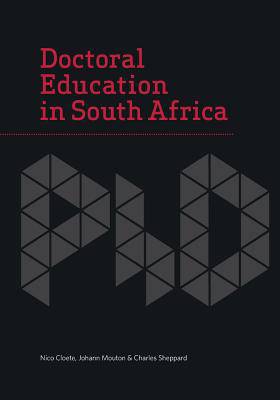
- Afhalen na 1 uur in een winkel met voorraad
- Gratis thuislevering in België vanaf € 30
- Ruim aanbod met 7 miljoen producten
- Afhalen na 1 uur in een winkel met voorraad
- Gratis thuislevering in België vanaf € 30
- Ruim aanbod met 7 miljoen producten
Zoeken
€ 86,45
+ 172 punten
Omschrijving
Worldwide, in Africa and in South Africa, the importance of the doctorate has increased disproportionately in relation to its share of the overall graduate output over the past decade. This heightened attention has not only been concerned with the traditional role of the PhD, namely the provision of future academics; rather, it has focused on the increasingly important role that higher education - and, particularly, high-level skills - is perceived to play in national development and the knowledge economy. This book is unique in the area of research into doctoral studies because it draws on a large number of studies conducted by the Centre of Higher Education Trust (CHET) and the Centre for Research on Evaluation, Science and Technology (CREST), as well as on studies from the rest of Africa and the world. In addition to the historical studies, new quantitative and qualitative research was undertaken to produce the evidence base for the analyses presented in the book. The findings presented in Doctoral Education in South Africa pose anew at least six tough policy questions that the country has struggled with since 1994, and continues to struggle with, if it wishes to gear up the system to meet the target of 5 000 new doctorates a year by 2030. Discourses framed around the single imperatives of growth, efficiency, transformation or quality will not, however, generate the kind of policy discourses required to resolve these tough policy questions effectively. What is needed is a change in approach that accommodates multiple imperatives and allows for these to be addressed simultaneously.
Specificaties
Betrokkenen
- Auteur(s):
- Uitgeverij:
Inhoud
- Aantal bladzijden:
- 296
- Taal:
- Engels
Eigenschappen
- Productcode (EAN):
- 9781928331001
- Verschijningsdatum:
- 8/12/2015
- Uitvoering:
- Paperback
- Formaat:
- Trade paperback (VS)
- Afmetingen:
- 178 mm x 254 mm
- Gewicht:
- 517 g

Alleen bij Standaard Boekhandel
+ 172 punten op je klantenkaart van Standaard Boekhandel
Beoordelingen
We publiceren alleen reviews die voldoen aan de voorwaarden voor reviews. Bekijk onze voorwaarden voor reviews.











